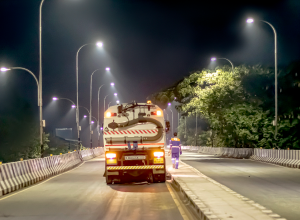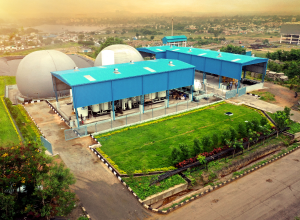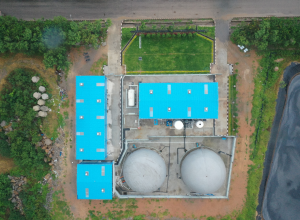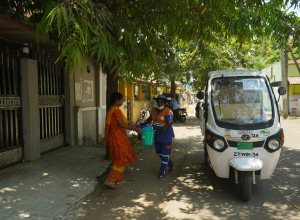Technology Driven Waste Collection & Transportation
Waste Collection & Transportation
To significantly improve Hyderabad’s waste management system, we successfully implemented an extensive waste collection and transportation project in collaboration with the Greater Hyderabad Municipal Corporation (GHMC). Our aim was to enable efficient door-to-door waste collection by leveraging GHMC’s Swachh auto trippers and incorporating automated portable self-compactors (PSC). Additionally, we introduced technology-enabled Bharat Benz Trucks to transport a substantial 35 tonnes of waste in a single run.
With the objective of fostering a healthier environment for the citizens of Hyderabad, the GHMC initiated a comprehensive program to enhance the garbage management system. This initiative involved the replacement of waste bins and vulnerable garbage sites on roads with strategically located Secondary Collection & Transport Points (SCTP).
Re Sustainability, a trusted partner in sustainability solutions, was entrusted with the responsibility of establishing and managing 90 SCTPs across 150 wards in Hyderabad. Following a successful pilot program, the project was expanded to encompass other areas of the city. Our collection and compacting processes were meticulously designed to ensure maximum efficiency. GHMC’s Swachh auto tippers were employed for systematic door-to-door waste collection, while our automated portable self-compactors (PSC) played a crucial role in compression and storage. The PSCs effectively minimize spillage on the ground, while significantly reducing odour and leachate concerns. Furthermore, these compactors are designed to facilitate source segregation, offering separate collection provisions for wet and dry waste.
Smart Fleet: Strategically positioned throughout the city, Bharath Benz Trucks efficiently collect compactors from designated transfer stations. These advanced trucks possess an impressive capacity of 35 tonnes and are equipped with cutting-edge IoT-based systems, enabling seamless real-time monitoring of the entire collection process.
Beyond their technological advancements, these trucks also feature driver awareness systems that provide crucial information on navigation and driver behaviour. This invaluable data is directly relayed to the command control center of Re Sustainability, ensuring optimal operational efficiency and safety.
Moreover, the trucks are thoughtfully designed with enclosed compartments, effectively eliminating any unpleasant odours. This feature not only contributes to a more pleasant environment but also enhances overall efficiency, compliance, and safety standards for the benefit of the entire community.
When it comes to secondary collection and transportation, our fleet sets a new benchmark in terms of performance, reliability, and sustainability. We take pride in our commitment to delivering top-notch service while prioritizing the well-being of our environment and community.
SCTPs: The SCTPs (Secondary Collection and Transfer Points) are compact sheds that efficiently utilize minimal land area while being fully equipped with Portable Compactor Systems (PSCs). The implementation of SCTPs has led to significant improvements in the city’s waste management system, effectively reducing the burden on existing transfer stations and paving the way for a decrease in their overall number within the city.
Moreover, the SCTPs have played a pivotal role in elevating waste segregation practices. By optimizing waste disposal processes, these facilities effectively minimize the distance travelled91 1 by primary collection vehicles and reduce waiting times for waste disposal. Consequently, this not only enhances collection efficiency but also boosts earnings for vehicle fleet operators.
By leveraging a technology-enabled fleet, alongside a seamless absence of human intervention, Re Sustainability’s waste management infrastructure is successfully driving the vision of a ‘Bin-free Hyderabad’. This innovative approach embraces advanced technology and automation to create an environment where traditional waste bins are no longer necessary, revolutionizing waste management practices for a cleaner and more sustainable future.
Project Showcase
- Zero Waste





